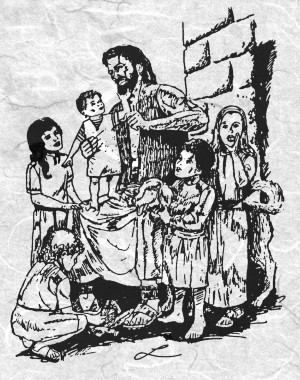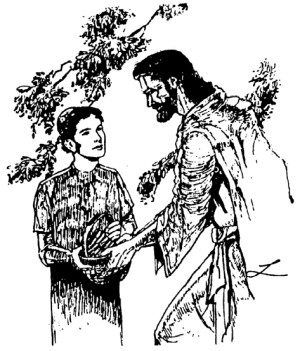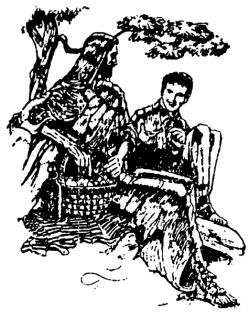Family: The Master Plan
| DRAFT: This page is in a tentative draft status. It may contain problems ranging from typographical errors to philosophic inconsistency. Nevertheless, it is offered under the be bold wiki publication model. |
This is a study guide of The Urantia Book that stresses the foundation of real families: tolerance, patience, and forgiveness. It presents an overview of the philosophy of life planning and character progression, with particular emphasis on the family as the very center of Jesus’ philosophy of life.[1]

"As are the families of the race or nation, so is its society." [84:7.1]
"This carpenter lad, now just past fourteen years of age, awakened to the realization that he had not only to fulfill the commission of his heavenly Father to reveal the divine nature on earth and in the flesh, but that his young human nature must also shoulder the responsibility of caring for his widowed mother and seven brothers and sisters—and another yet to be born. This lad of Nazareth now became the sole support and comfort of this so suddenly bereaved family. Thus were permitted those occurrences of the natural order of events on Urantia which would force this young man of destiny so early to assume these heavy but highly educational and disciplinary responsibilities attendant upon becoming the head of a human family, of becoming father to his own brothers and sisters, of supporting and protecting his mother, of functioning as guardian of his father’s home, the only home he was to know while on this world." [126:2.2]
"Jesus cheerfully accepted the responsibilities so suddenly thrust upon him, and he carried them faithfully to the end...For almost a score of years (until he began his public ministry) no father could have loved and nurtured...any more affectionately and faithfully than Jesus cared for...all the...members of his family." —from [126:2.1-3.2]
"The family occupied the very center of Jesus’ philosophy of life—here and hereafter." [140:8.14]
"In this work of passing on the cultural torch to the next generation, the home will ever be the basic institution...The quality of the social torchbearers will determine whether civilization goes forward or backward. The homes, churches, and schools of one generation predetermine the character trend of the succeeding generation. The moral and spiritual momentum of a race or a nation largely determines the cultural velocity of that civilization." —from [81:6.23-26]
Family life

"Real families are built upon tolerance, patience, and forgiveness." [142:7.11]
"Almost everything of lasting value in civilization has its roots in the family." [68:2.8]
"All did go well until that fateful day of Tuesday, September 25 [A.D. 8], when a runner from Sepphoris brought to this Nazareth home the tragic news that Joseph had been severely injured by the falling of a derrick while at work on the governor’s residence...Joseph died of his injuries." —from [126:2.1]
"[Jesus] was a real though youthful father to the family; he spent every possible hour with the youngsters, and they truly loved him." [127:1.8]
"Marriage is honorable and is to be desired by all men. The fact that the Son of Man pursues his earth mission alone is in no way a reflection on the desirability of marriage. That I should so work is the Father’s will, but this same Father has directed the creation of male and female, and it is the divine will that men and women should find their highest service and consequent joy in the establishment of homes for the reception and training of children, in the creation of whom these parents become copartners with the Makers of heaven and earth. And for this cause shall a man leave his father and mother and shall cleave to his wife, and they two shall become as one."[2] [167:5.7]
"The great threat against family life is the menacing rising tide of self-gratification, the modern pleasure mania...And this overindulgence, this widely spread pleasure mania, now constitutes the greatest threat that has ever been leveled at the social evolutionary institution of family life, the home." —from [84:8.1]
"Of all social relations calculated to develop character, the most effective and ideal is the affectionate and understanding friendship of man and woman in the mutual embrace of intelligent wedlock. Marriage, with its manifold relations, is best designed to draw forth those precious impulses and those higher motives which are indispensable to the development of a strong character." —restated from Rodan of Alexandria, [160:2.6]
"Children are permanently impressed only by the loyalties of their adult associates; precept or even example is not lastingly influential." [100:1.4]
Additional study (the student is encouraged to make their own notes regarding these and any other references):
| General topic or theme | Reference in The Urantia Book (with clickable link to text) |
|---|---|
| Equality of the sexes | [52:2.7] |
| Home life on a neighboring planet | [72:3] |
| Home life of Adam and Eve | [74:6] |
| Home life of Adamites | [76:3.9] |
| The marriage institution | [Paper 83] |
| Marriage and family life | [Paper 84] |
| Death of Joseph the father of Jesus | [126:2.2] |
| Jesus provides for his family | [129:2.1] |
| Jesus’ lesson on the family | [142:7] |
| Rodan’s art of living | [160:2] |
| Jesus on marriage and divorce | [167:5] |
Positive nurturing

"In his home and throughout his public-teaching career Jesus invariably employed the positive form of exhortation. Always and everywhere did he say, 'You shall do this—you ought to do that.' Never did he employ the negative mode of teaching derived from the ancient taboos. He refrained from placing emphasis on evil by forbidding it, while he exalted the good by commanding its performance." [127:4.2]
"Jesus began wise discipline upon his brothers and sisters at such an early age that little or no punishment was ever required to secure their prompt and wholehearted obedience. The only exception was Jude, upon whom on sundry occasions Jesus found it necessary to impose penalties for his infractions of the rules of the home. On three occasions when it was deemed wise to punish Jude for self-confessed and deliberate violations of the family rules of conduct, his punishment was fixed by the unanimous decree of the older children and was assented to by Jude himself before it was inflicted." [127:4.3]
"A father’s love need not pamper, and it does not condone evil, but it is always anticynical. Fatherly love has singleness of purpose, and it always looks for the best in man; that is the attitude of a true parent." [140:5.12]
"The psychology of a child is naturally positive, not negative. So many mortals are negative because they were so trained. When it is said that the child is positive, reference is made to his moral impulses, those powers of mind whose emergence signals the arrival of the Thought Adjuster." [103:2.5]
"Some degree of recognition and a certain amount of appreciation are essential to the development of human character. Without the genuine love of a home, no child can achieve the full development of normal character." [160:2.6]
Additional study (the student is encouraged to make their own notes regarding these and any other references):
| General topic or theme | Reference in The Urantia Book (with clickable link to text) |
|---|---|
| God the Father is the model | [2:6.4] |
| Kids need both fathers and mothers | [47:1.6] |
| Parents learn mercy from parenting | [54:4.2] |
| Young Jesus’ parenting style | [127:4] |
| Young Jesus was generous of his time to kids | [128:6.10-11] |
| Outcome of Thomas Didymus’ unfortunate early home life | [139:8] |
| Fatherly love in the place of brotherly love | [140:5] |
| Priorities: earthly family versus the kingdom of heaven | [140:8.14] |
| Positive instruction, not negative | [140:8.21] |
| Immature minds may see parental correction as wrath | [142:2] |
| Lax or indulgent parenting regarding morality | [147:5.9] |
| Fear or love of a parent | [149:6] |
| A parent’s forgiveness | [174:1] |
Balanced education

"The most valuable part of Jesus’ early education was secured from his parents in answer to his thoughtful and searching inquiries. Joseph never failed to do his full duty in taking pains and spending time answering the boy’s numerous questions. From the time Jesus was five years old until he was ten, he was one continuous question mark. While Joseph and Mary could not always answer his questions, they never failed fully to discuss his inquiries and in every other possible way to assist him in his efforts to reach a satisfactory solution of the problem which his alert mind had suggested." [123:2.3]
"Ordinarily the girls of Jewish families received little education, but Jesus maintained (and his mother agreed) that girls should go to school the same as boys, and since the synagogue school would not receive them, there was nothing to do but conduct a home school especially for them." [127:1.5]
"Men and women are partners with God in that they co-operate to create beings who grow up to possess themselves of the potential of immortal souls." [133:2.2]
"The security of civilization itself still rests on the growing willingness of one generation to invest in the welfare of the next and future generations. And any attempt to shift parental responsibility to state or church will prove suicidal to the welfare and advancement of civilization." [84:7.27]
"Even secular education could help in this great spiritual renaissance if it would pay more attention to the work of teaching youth how to engage in life planning and character progression. The purpose of all education should be to foster and further the supreme purpose of life, the development of a majestic and well-balanced personality. There is great need for the teaching of moral discipline in the place of so much self-gratification. Upon such a foundation religion may contribute its spiritual incentive to the enlargement and enrichment of mortal life, even to the security and enhancement of life eternal." [195:10.7]
Additional study (the student is encouraged to make their own notes regarding these and any other references):
| General topic or theme | Reference in The Urantia Book (with clickable link to text) |
|---|---|
| The purpose of education | [16:6.11] |
| Symmetric education modeled on high | [37:6.4] and [37:6.6] |
| Civilization's essentials are taught, not inherited genetically | [68:0.2] |
| Education enables experience of 7 levels of mortal wisdom | [71:7] |
| How a neighboring world addresses primary, secondary, and collegiate education | [72:4] and [72:8] |
| Proper leisure and science help maintain civilization | [81:6.6] and [81:6.10] |
| Jesus' parents were teachers | [122:5.7] |
| Jesus' early education and inquisitiveness | [123:2] and [123:5] |
| Jesus' education up to early manhood | [124:0] and [124:1] and [121:4] |
| The homes and the churches/synagogues | [126:1.3] |
| Education for girls | [127:1.5] |
| Lessons from ordination sermon | [140:4] |
| Jesus on teaching the gospel | [159:3] |
Relationships

"A wise parent never takes sides in the petty quarrels of his own children." [141:3.3]
"Jesus received his moral training and spiritual culture chiefly in his own home. He secured much of his intellectual and theological education from the chazan. But his real education—that equipment of mind and heart for the actual test of grappling with the difficult problems of life—he obtained by mingling with his fellow men. It was this close association with his fellow men, young and old, Jew and gentile, that afforded him the opportunity to know the human race. Jesus was highly educated in that he thoroughly understood men and devotedly loved them." [123:5.8]
"And I wish that you would love and trust one another...Have you not read in the Scripture where it is written: 'It is not good for man to be alone. No man lives to himself'? And also where it says: 'He who would have friends must show himself friendly'? And did I not even send you out to teach, two and two, that you might not become lonely and fall into the mischief and miseries of isolation? You also well know that, when I was in the flesh, I did not permit myself to be alone for long periods. From the very beginning of our associations I always had two or three of you constantly by my side or else very near at hand even when I communed with the Father. Trust, therefore, and confide in one another." —from [193:3.2]
"We know that any child can best relate himself to reality by first mastering the relationships of the child-parent situation and then by enlarging this concept to embrace the family as a whole. Subsequently the growing mind of the child will be able to adjust to the concept of family relations, to relationships of the community, the race, and the world, and then to those of the universe, the superuniverse, even the universe of universes." [8:1.11]
"Spiritual growth is mutually stimulated by intimate association with other religionists." [100:0.2]
"Fear, envy, and conceit can be prevented only by intimate contact with other minds." —restated from Rodan of Alexandria, [160:2.7]
Additional study (the student is encouraged to make their own notes regarding these and any other references):
| General topic or theme | Reference in The Urantia Book (with clickable link to text) |
|---|---|
| The concept of true relations | [56:10.11-13] |
| Fatality of a solitary life | [111:4.7] |
| The dimensions of personality | [112:1.10] |
| Jesus as a sociable neighborhood lad | [123:5.15] |
| Jesus as a young social leader | [124:1.13] |
| Jesus socializes with more mature minds | [124:2] |
| Jesus' advice on socializing with your boss | [130:2.4] |
| Spiritual fellowship over temporal relations | [141:7.5] |
| Do unto others requires socialization | [140:10.5] |
| Jesus on tact and emotional maturity | [156:5.18] |
| Rodan's art of living | [160:2] |
| Jesus' final word on friendship | [193:3.2] |
| Lessons from Judas's isolation | [193:4] |
Religious experience

"Throughout his course of study Jesus learned much and derived great inspiration from the regular Sabbath sermons in the synagogue...And at Nazareth they were also more liberal regarding the observance of the Sabbath. It was therefore the custom for Joseph to take Jesus out for walks on Sabbath afternoons, one of their favorite jaunts being to climb the high hill near their home, from which they could obtain a panoramic view of all Galilee...Jesus’ earliest training, aside from that of the home hearth, had to do with a reverent and sympathetic contact with nature." — from [123:5.10-14]
"Prayer time in [Jesus’] household was the occasion for discussing anything and everything relating to the welfare of the family." [127:4.2]
"A child is wholly dependent on his parents and the associated home life for all his early concepts of everything intellectual, social, moral, and even spiritual since the family represents to the young child all that he can first know of either human or divine relationships...The child’s subsequent life is made happy or unhappy, easy or difficult, in accordance with his early mental and emotional life, conditioned by these social and spiritual relationships of the home. A human being’s entire afterlife is enormously influenced by what happens during the first few years of existence." —from [177:2.5]
"Together with children, religion is the great unifier of family life, provided it is a living and growing faith. Family life cannot be had without children; it can be lived without religion, but such a handicap enormously multiplies the difficulties of this intimate human association. During the early decades of the twentieth century, family life, next to personal religious experience, suffers most from the decadence consequent upon the transition from old religious loyalties to the emerging new meanings and values." [99:4.2]
"The entire religious experience of such a child is largely dependent on whether fear or love has dominated the parent-child relationship." [92:7.11]
Additional study (the student is encouraged to make their own notes regarding these and any other references):
| General topic or theme | Reference in The Urantia Book (with clickable link to text) |
|---|---|
| . | [16:6.7] |
| . | [91:3] |
| . | [92:7] |
| . | [Paper 99] |
| . | [Paper 100] |
| . | [Paper 101] |
| . | [Paper 102] |
| . | [Paper 103] |
| . | [Paper 111] |
| . | [123:3.1] and [123:3.6-7] |
| . | [123:5.12-14] |
| (or entire section? or just paras 1 and 2?) | [124:2.1-2] |
| . | [Paper 125] |
| . | [Paper 126:2.5] |
| . | [Paper 126:3.3-4] |
| . | [Paper 142:2.2] |
Adolescence

"As [Jesus] grew up to manhood, he passed through all those conflicts and confusions which the average young persons of previous and subsequent ages have undergone. And the rigorous experience of supporting his family was a sure safeguard against his having overmuch time for idle meditation or the indulgence of mystic tendencies." [126:5.9]
"This was one of several years during which Jesus’ brothers and sisters were facing the trials and tribulations peculiar to the problems and readjustments of adolescence. Jesus now had brothers and sisters ranging in ages from seven to eighteen, and he was kept busy helping them to adjust themselves to the new awakenings of their intellectual and emotional lives. He had thus to grapple with the problems of adolescence as they became manifest in the lives of his younger brothers and sisters." [128:2.1]
"Farseeing [parents] also make provision for the necessary discipline, guidance, correction, and sometimes restraint of their young and immature offspring." [142:7.9]
"The real test of marriage, all down through the ages, has been that continuous intimacy which is inescapable in all family life. Two pampered and spoiled youths, educated to expect every indulgence and full gratification of vanity and ego, can hardly hope to make a great success of marriage and home building—a lifelong partnership of self-effacement, compromise, devotion, and unselfish dedication to child culture." [83:7.6]
"But just so long as society fails to properly educate children and youths, so long as the social order fails to provide adequate premarital training, and so long as unwise and immature youthful idealism is to be the arbiter of the entrance upon marriage, just so long will divorce remain prevalent. And in so far as the social group falls short of providing marriage preparation for youths, to that extent must divorce function as the social safety valve which prevents still worse situations during the ages of the rapid growth of the evolving mores." [83:7.8]
Additional study (the student is encouraged to make their own notes regarding these and any other references):
| General topic or theme | Reference in The Urantia Book (with clickable link to text) |
|---|---|
| . | [54:4.2] |
| . | [99:6.3] |
| . | [128:2] |
| . | [128:7] |
| . | [126:0.1] |
| . | [127:0.3] |
| . | [127:4.5-7] |
| . | [128:6] |
| . | [128:7.3-4] |
| . | [129:1.13] |
| . | [130:6] |
| . | [133:1] |
| . | [169:1] |
| . | [187:4] |
| . | [195:10.10] and [195:10.17] |
Facing difficulties

"I do not promise to deliver you from the waters of adversity, but I do promise to go with you through all of them." [159:3.13]
"Jesus possessed the ability effectively to mobilize all his powers of mind, soul, and body on the task immediately in hand. He could concentrate his deep-thinking mind on the one problem which he wished to solve, and this, in connection with his untiring patience, enabled him serenely to endure the trials of a difficult mortal existence—to live as if he were 'seeing Him who is invisible.'" [127:3.15]
"Jesus hardly regarded this world as a 'vale of tears.' He rather looked upon it as the birth sphere of the eternal and immortal spirits of Paradise ascension, the 'vale of soul making.'" [149:5.5]
"No man can ever fear that the Creator does not know the nature or extent of his temporal afflictions." [188:5.12]
"In this world you will have tribulation, but be of good cheer; I have triumphed in the world and shown you the way to eternal joy and everlasting service." [181:1.6]
"Difficulties may challenge mediocrity and defeat the fearful, but they only stimulate the true children of the Most Highs." [48:7.7]
"Respect of the child for his parents arises, not in knowledge of the obligation implied in parental procreation, but naturally grows as a result of the care, training, and affection which are lovingly displayed in assisting the child to win the battle of life. The true parent is engaged in a continuous service-ministry which the wise child comes to recognize and appreciate." [84:7.26]
"Personal, spiritual religious experience is an efficient solvent for most mortal difficulties; it is an effective sorter, evaluator, and adjuster of all human problems. Religion does not remove or destroy human troubles, but it does dissolve, absorb, illuminate, and transcend them." [196:3.1]
"The ideas, motives, and longings of a lifetime are openly revealed in a crisis." [187:2.4]
Additional study (the student is encouraged to make their own notes regarding these and any other references):
| General topic or theme | Reference in The Urantia Book (with clickable link to text) |
|---|---|
| Feast and fatten upon the hard things of life | [26:5.3] |
| Angels know our life is hard | [38:2.1] |
| Psalm 23, fully restored | [48:6.10] |
| Pray, but not lazily | [91:6.5] |
| Confusion is okay, consciously resisting God is not | [110:3.5] |
| . | [124:2.4] |
| . | [126:5] |
| . | [Paper 127] |
| . | [128:6] |
| . | [129:4.5] |
| . | [133:2.1] |
| . | [160:1.7-11] |
| . | [188:5.10] |
| . | [194:2.1] |
| . | [196:0] and [196:1] |
Importance of early home life

"The Master spent this last day of quiet on earth visiting with this truth-hungry youth and talking with his Paradise Father. This event has become known on high as 'the day which a young man spent with God in the hills.'" [177:1.3]
"You are the product of a home where the parents bear each other a sincere affection, and therefore you have not been overloved so as injuriously to exalt your concept of self-importance...Wise parents, such as yours, see to it that their children do not have to wound love or stifle loyalty in order to develop independence and enjoy invigorating liberty when they have grown up to your age...Such a childhood training produces a type of loyalty which assures me that you will go through with the course you have begun." —from [177:2.2-4]

The importance of early home life is found in a discussion by Jesus with John Mark on April 5, A.D. 30. The entire discussion is well worth studying: [177:2.2-7]
Epilogue
Let man enjoy himself;
let the human race find pleasure
in a thousand and one ways;
let evolutionary mankind explore
all forms of legitimate self-gratification,
the fruits of the long upward biologic struggle.
Man has well earned
some of his present-day joys and pleasures.
But look you well to the goal of destiny!
Pleasures are indeed suicidal
if they succeed in destroying property,
which has become the institution of self-maintenance;
and self-gratifications have indeed cost a fatal price
if they bring about the collapse of marriage,
the decadence of family life,
and the destruction of the home—
man’s supreme evolutionary acquirement
and civilization’s only hope of survival.
[84:8.6]
Notes
- ↑ Originally compiled by Ann Garner in November 1993. Artwork by Larry Mullins. Edited for web presentation; and quotations from The Urantia Book have been re-extracted to ensure they match the inviolate text.
- ↑ Text appearing in this style is directly attributed to Jesus of Nazareth, either directly quoted or restated in modern phraseology.